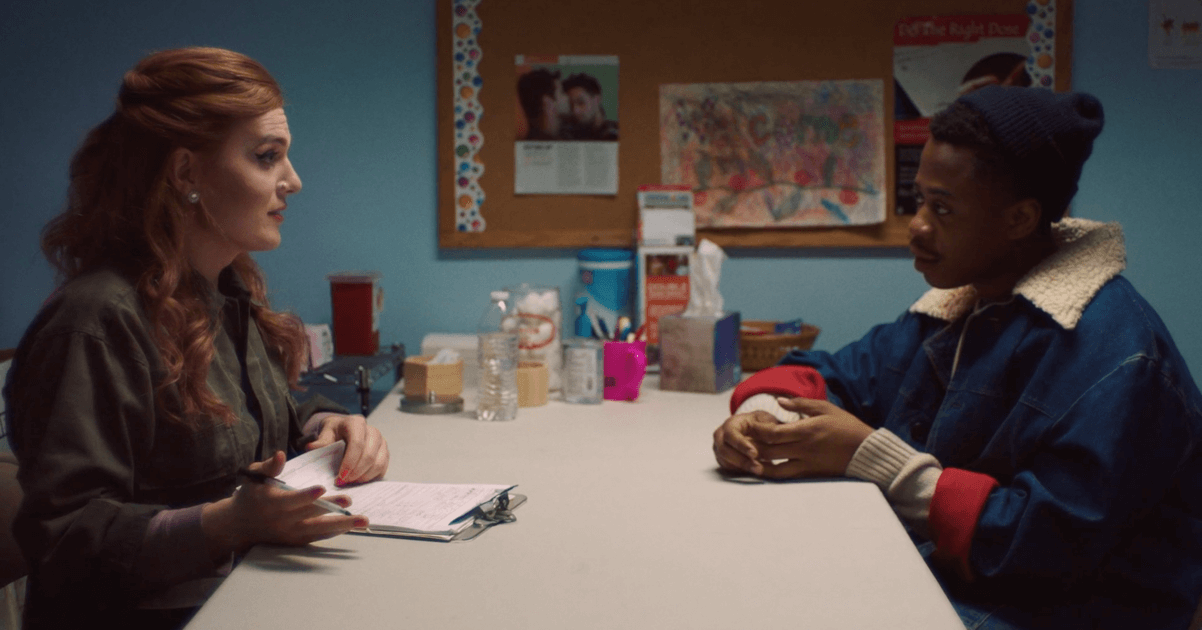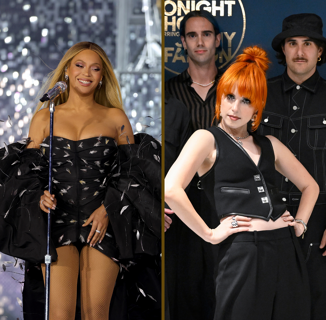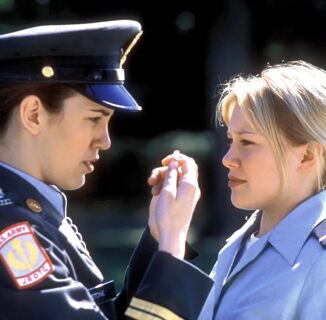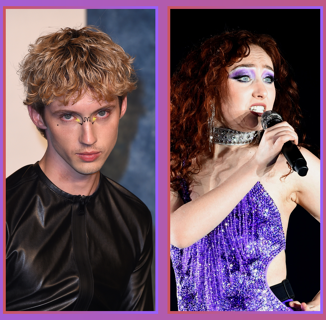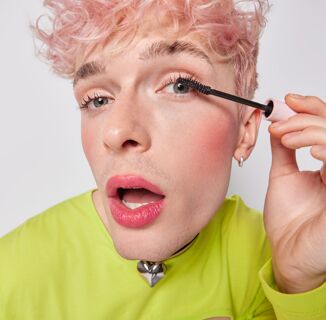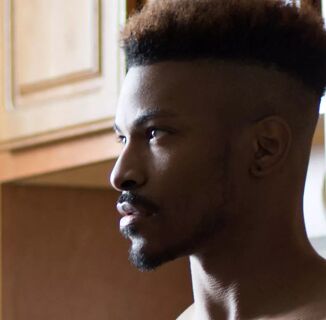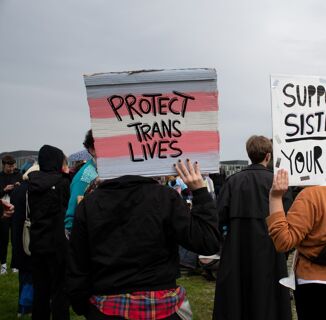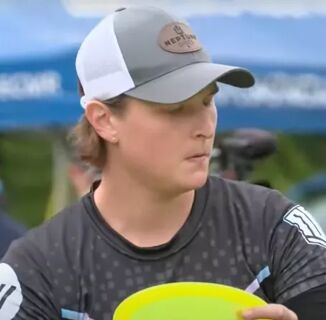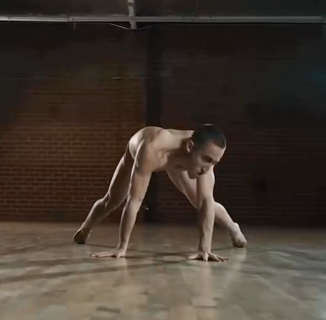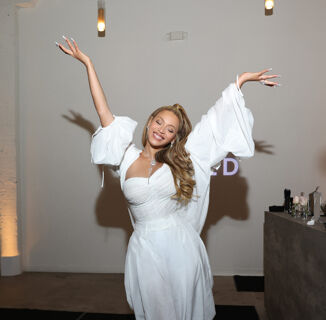It’s no secret that there’s a lack of trans and black queer representation in the media. Here to answer the call for more nuanced depictions of the queer community is the T, a series from Bea Cordelia and Daniel Kyri, both writers-in-residence for the city of Chicago. The series, produced and developed by Full Spectrum Features and OTV/Open Television, centers on the stories of Chicago residents Jo, a white trans woman looking for intimacy and Carter, a queer Black man facing a conservative upbringing.
The series’ official trailer drops today, exclusively premiering onINTO.Along with the trailer, we spoke to Bea Cordelia and Daniel Kyri about the series and its implications for queer and trans people, including black queer people.
Can you tell us a little bit about the genesis of the T? Where did the idea for the series come from and how did all the principal players fall into place?
Bea Cordelia (Creator, Writer, Director, Producer, “Jo”): the T was originally inspired by my relationship with the last boyfriend I had before coming out as trans. In the years since then, our relationship has grown into an intimate best friendship that has singularly taught me more about the human capacity for love than anything else. It’s an odd thing that I’ve seen more predominantly in queer communities: exes genuinely becoming friends after even pretty devastating heartbreak.
Some months after I’d written a pilot for the show and forgotten about it, Daniel approached me about creating a web series together, about a trans woman and queer Black man who are best friends. I told him I had already written it, and sent him the script. He loved it, and came onboard. The script changed immensely and only for the better once we started collaborating. The series became much more of an even two-hander between the two friends, rather than more skewed from Jo’s perspective.
Did you have and Daniel have a strong friendship prior to creating this together? How much of that friendship makes its way into the show?
BC: Not a strong one, no. We initially met at 17 when we were both doing After School Matters programs at Gallery 37–ironically, a mutual friend set us up–and reconnected years later at Salonathon, after college. We were more colleagues by the time we began working on the T, but in the year and a half of writing sessions and grant applications and rewriting sessions and meetings with lawyers and a lit birthday trip to Denver and pre-production and filming and now finally post-production, we’ve become best friends in our own right–and our work is stronger for it, too.
One of the things I love about the trailer is that it shows that the show will not shy away from probing the complicated relationships between queer men and trans women in the LGBTQ community. What do you think the show has to say about this community relationship through this particular friendship?
BC: A running theme throughout the show is the power and potential of intersectionality. Our characters are not-so-loosely autobiographical in that regard. Like Jo, I am a white trans woman from the North Side of Chicago. Like Carter, Daniel is a queer Black man from the South Side of Chicago. Although they and we have all these supposed oppositions in terms of identity, they nevertheless share a wealth of common language and experience. And they’re so much happier for it! They have someone who understands them intimately and on whom they can lean when shit gets tough (which is often). The show asks us to acknowledge and celebrate our differences, but without dividing ourselves along those lines. The contours of our humanity may look and sound different, and come with vastly distinct histories, but that doesn’t have to stop us from creating community in the present.
What was it like creating a story collaboratively in this way? Did you alternate who wrote certain scenes? Did you give each other notes?
BC: So Daniel and I are cosmic twins: we were born within 24 hours of each other, both in Chicago. We’re Libras. We’ve found that we work unreasonably well together. When it comes to writing, we each get first and final say on each of our respective character’s scenes and storylines (we are the experts on our own stories, after all). However, we both workshop all of the scenes, sometimes together, sometimes independently, and sometimes with other actors. We write our joint scenes together. Having each other’s discerning eye to balance out our own personal visions (see: Libras) has been the biggest gift. We check and push and encourage each other; we dream up things together that neither of us could have on our own.
In your Kickstarter, you explicitly bring up the state of trans storytelling in television and, frankly, how underserved the population is in media. What about the storytelling in the T excites you to bring into the world?
BC: Oh goodness, so much. Jo’s main arc in the series deals with this guy Robin who she starts seeing. Using the series to explore the complicated relationships between trans women and cis men was always at the top of my list. So many cis men out there love trans women, but so few of them would ever admit that to anyone in their lives besides the women ourselves, which leaves us in a constant state of being asked to stay invisible. There’s also the sisterhood that Jo forms with Emerie, a Latina trans woman, and the ways they uniquely understand and uplift each other. And then of course there’s Carter’s whole side of the series, which looks at a queer Black man experiencing a pointed sense of placelessness on account of how his identities interact with his various surroundings.

There are certainly a lack of black queer characters on screen, as well. What was important about bringing Carter’s character to the screen?
Daniel Kyri (Creator, Writer, Director, Producer, “Carter”): The important thing about bringing Carter to screen is the increase in visibility it provides for a process of authentic representation. Carter isn’t a queer/gay man who just happens to Black, but rather he is a Black man who happens to be queer. The majority of his worldly experiences are dictated by that thing which is most visible: his Blackness. So the ways in which he navigates predominately white spaces differ from how he moves through spaces closer to his home on the South Side. There can be a kind of social survival that audiences observe through his point of view. A large part of Carter’s journey can be credited to my own experiences of having to adapt or acclimate or “code-switch.” That story is one that isn’t often told.
What has it been like to finance a show through Kickstarter? What practical advice would you give to other queer people looking to get their own projects off the ground?
BC: Most of our funding has come from a grueling, constant stream of grant applications. The Kickstarter is helping us get this last leg of funding we need. But for advice I would say to buckle down. It’s difficult work, and especially at the beginning when there’s so little promise of seeing the thing come to life. You have to be insanely dedicated to realize something of this scope at a DIY level. I dreamed up an early version of this show over two years ago. So know what you’re making, really WANT to make it, and surround yourself with community/collaborators you heavily fuck with and who are gonna show up as hard as you will.
What does it mean to you to create queer television characters and have people invite them into their lives?
BC: To be honest, I have so few cishet friends at this point [laughs] that it just feels like a natural extension of my life. The characters are complex and flawed and beautiful, and their queerness forms an inextricable part of that. As for inviting people into their lives, there’s a term I’ve coined for this idea, it’s called weaponized vulnerability. It’s the idea that marginalized people can best enact social change by publicly owning their own raw truth, rather than succumb to the tempting shouting matches in the comment sections and on the talk shows. So we appear onscreen in all our naked hope and grief and joy and rage and love, and let that do the work to change people’s hearts about LGBTQ folks. And from my extensive career as a solo performance artist, I can attest to how well it works.
You and Daniel are both artists in residence for the city of Chicago, who helped contribute to making The T a reality. Can you talk quickly about what it means to create a queer narrative centered around Chicago, especially when most shows center in other cities like New York or Los Angeles?
BC: Chicago is the most segregated city in the county, and has been. It’s the perfect setting for a story about the transformational power of intersectionality. Plus, Chicago queers also show up hard for each other. We carve community and space for ourselves when the rest of our reality isn’t as welcoming. Chicago’s a big city, but it’s still in the Midwest. So the city offers an inherent sense of urgency and survival for our communities. We’re honored to be Chicago’s Filmmakers-in-Residence this year to create the T; we want to do the city justice in our representation.
Both Carter and Jo’s parents are shown in the trailer. How does this show deal with biological family versus alternative family?
BC: Jo has an awesome relationship with her family; Carter doesn’t, but is working on it. It was important for us to show a range of what blood family can look like for LGBTQ folks, and lean away from the sole narrative of those relationships being irreparably broken. Of course, even Jo’s supportive blood family has their limits, because her transness and queerness is something they don’t know. Which is why we really elevate alternative family, too. Those are often the most sustaining relationships that keep us as queer and trans people going.
Help make sure LGBTQ+ stories are being told...
We can't rely on mainstream media to tell our stories. That's why we don't lock our articles behind a paywall. Will you support our mission with a contribution today?
Cancel anytime · Proudly LGBTQ+ owned and operated
Read More in Culture
The Latest on INTO
Subscribe to get a twice-weekly dose of queer news, updates, and insights from the INTO team.
in Your Inbox

